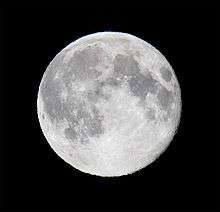moon
English
.jpg)

Etymology
From Middle English mone, from Old English mōna (“moon”), from Proto-Germanic *mēnô (“moon”), from Proto-Indo-European *mḗh₁n̥s (“moon, month”), probably from *meh₁- (“to measure”). Cognate with Scots mone, mune, muin (“moon”), North Frisian muun (“moon”), West Frisian moanne (“moon”), Dutch maan (“moon”), German Mond (“moon”), Danish måne (“moon”), Norwegian Bokmål måne (“moon”), Norwegian Nynorsk måne (“moon”), Swedish måne (“moon”), Icelandic máni (“moon”), Latin mēnsis (“month”). See also month, a related term within Indo-European.
Pronunciation
- IPA(key): /muːn/
Audio (US) (file) Audio (UK) (file) Audio (file) - Rhymes: -uːn
Noun
moon (plural moons)
- (mistaken capitalization of Moon, with "the") the Earth's only permanent natural satellite.
- (colloquial, by extension of Moon) Any natural satellite of a planet.
- the moons of Jupiter
- (literary) A month, particularly a lunar month.
- 1603, William Shakespeare, Othello:
- For since these arms of mine had seven years' pith,
Till now some nine moons wasted, they have used
Their dearest action in the tented field…
- 1737, John Brickell, The natural history of North-Carolina, page 308-309:
- They number their age by Moons or Winters, and say a Woman or a Man is so many Moons old, and so they do with all memorable Actions in life, accounting it to be so many Moons or Winters since such or such a thing happened. Note: in earlier modern English, many nouns were capitalized, similar to present day German.
- 1822, Thomas Love Peacock, Maid Marian, page 238:
- Many moons had waxed and waned when on the afternoon of a lovely summer day a lusty broad-boned knight was riding through the forest of Sherwood.
- 2002, Russell Allen, "Incantations of the Apprentice", on Symphony X, The Odyssey.
- Through eerie reach of ancient woods / Where lumbering mists arise / I journey for nines moons of the year / To where a land of legend lies
-
- A crescent-like outwork in a fortification.
- The eighteenth trump/major arcana card of the Tarot.
- (cartomancy) The thirty-second Lenormand card.
Synonyms
- (Earth's sole natural satellite): Moon
- (natural satellite of a planet): satellite, natural satellite
- (month): calendar month, lunar month, month
- See also Thesaurus:moon
Derived terms
- blood moon
- blue moon
- crescent moon
- full moon
- half moon
- hang the moon
- harvest moon
- howl at the moon
- hunter's moon
- man in the moon
- moon bear
- moon-blind
- moon cake
- mooncake
- mooncalf
- moon-face
- moonfish
- moonflower
- moon guitar
- mooning
- moonish
- moon language
- moonlight
- moonlit
- moonly
- moon pool
- moonquake
- moonraker
- moonrise
- moonrunes
- moonsail
- moonsault
- moonset
- moonshine
- moon shot
- moonsickle
- moonstruck
- moonwalk
- moonwort
- moon zither
- new moon
- old moon
- once in a blue moon
- over the moon
- phase of the moon
- smuggler's moon
- thumbnail moon
- waning moon
- waxing moon
Translations
|
|
|
|
|
|
- The translations below need to be checked and inserted above into the appropriate translation tables, removing any numbers. Numbers do not necessarily match those in definitions. See instructions at Wiktionary:Entry layout#Translations.
Verb
moon (third-person singular simple present moons, present participle mooning, simple past and past participle mooned)
- (transitive, colloquial) To display one's buttocks to, typically as a jest, insult, or protest.
- (intransitive, US, colloquial) (usually followed by over or after) To fuss over something adoringly; to be infatuated with someone.
- Sarah mooned over Sam's photograph for months.
- You've been mooning after her forever, why not just ask her out?
- 2017 January 12, Jesse Hassenger, “A literal monster truck is far from the stupidest thing about Monster Trucks”, in The Onion AV Club:
- On some level, the filmmakers behind Monster Trucks must have recognized the ill fit of Till playing a teenager, because they cast Jane Levy, a 27-year-old who can pass for younger but not a decade younger, as Meredith, a nerdy classmate of Tripp’s who moons over him as she insists on making an appointment to tutor him in biology.
- To spend time idly, absent-mindedly.
- 1898, Joseph Conrad, Youth
- We were only three on board. The poor old skipper mooned in the cabin.
- 1898, Joseph Conrad, Youth
- (transitive) To expose to the rays of the Moon.
- Holland
- If they have it to be exceeding white indeed, they seethe it yet once more, after it hath been thus sunned and mooned.
- Holland
- (cryptocurrency) to rise in price rapidly (describing a coin or token).
Translations
|
|
Related terms
- month
- moonsick
Further reading


Bavarian
Etymology
From Middle High German man, from Old High German man, from Proto-Germanic *mann-. Cognate with German Mann, Dutch man, English man, Icelandic maður, Swedish man, Gothic 𐌼𐌰𐌽𐌽𐌰 (manna).
References
- “moon” in Patuzzi, Umberto, ed., (2013) Ünsarne Börtar [Our Words], Luserna, Italy: Comitato unitario delle linguistiche storiche germaniche in Italia / Einheitskomitee der historischen deutschen Sprachinseln in Italien
Finnish
Pronunciation
- Hyphenation: moon
- IPA(key): /ˈmoːn/, [ˈmo̞ːn]
Manx
Mutation
| Manx mutation | ||
|---|---|---|
| Radical | Lenition | Eclipsis |
| moon | voon | unchanged |
| Note: Some of these forms may be hypothetical. Not every possible mutated form of every word actually occurs. | ||
North Frisian
Etymology
From Old Frisian man, from Proto-Germanic *mann-, probably ultimately from Proto-Indo-European *mon-.